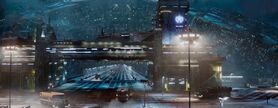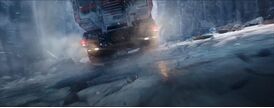It's been a long time since I've seen a movie. What attracted me this time was the movie version of Liu Cixin's novel "The Wandering Earth".
The novel was also read a few years ago, but I still remember some of the plot. What a spectacle the mind can imagine to have the entire Earth leave the solar system to find a new home!
I have to say that in the first few minutes of the show, the picture was still very shocking. Life in the dungeons of the future, the gigantic machines on the ground, are not described so carefully in the novel. But after a while, I found that the plot that I had expected had never happened. Maybe the movie omits some details and tweaks the characters slightly to make it look better on screen. So I turned my attention to the story that the film portrayed.
But unfortunately, I was disappointed again. the reason is simple:
It is fundamentally flawed.
The plot of the film adaptation has some fatal scientific flaws. I'll first explain what these problems are, and then explain why I can't tolerate them.
(There are spoilers in the following paragraphs, and there are many ideas in science. If you are not interested, you can quickly read the key points until the dividing line)
Start by reviewing the background of the film. Some scientists have discovered that the sun will evolve into a red giant in a few hundred years. Fortunately, humans have mastered the technology of heavy nuclear fusion, which can create a stone-burning earth engine that generates huge thrust. In order to allow human civilization to continue, humans use these technologies to push the earth, trying to leave the solar system and fly to the Alpha Centauri star. (The novel says why not use a spaceship, because all attempts to construct a stable ecosystem have ended in failure. Let's accept it first)
The main story told in the movie is that in order to leave the solar system, the earth needs to use the gravitational action of Jupiter. But unfortunately, most of the Earth's engines fail due to Jupiter's gravitational effect (specifically, the effect of tidal forces), and the characters in the story make the fate of being torn apart in order to save the earth from entering Jupiter's Losy limit. a series of measures. From repairing engines, to igniting chemical reactions on Jupiter's surface with Earth's engines, to igniting chemical reactions with the self-destruction of the space station, etc.
Let's first see, from a physical point of view, whether the Earth will hit Jupiter. In the movie, we find that Earth's engine is broken due to Jupiter's gravitational pull. But even if basically all of the engines fail, would the Earth suddenly and massively change the direction of its motion? the answer is negative. If all thrust was lost, the Earth would follow a pre-calculated orbit. If you ignore the influence of the gravity of other stars and some other small perturbations, and ignore the insignificant mass of the earth relative to Jupiter 1/317 times, this is basically a conic curve from Jupiter. I believe all physicists since Newton knew this. In the words of high school physics: the object that flies past Jupiter will always fly to the Jupiter entry point. At this time, Jupiter's gravity can no longer provide the centripetal force to continue to pull the object past, and then the object will fly away from Jupiter and float to Jupiter's gravity. Go where it can't be affected. There is simply no need to keep the engine on track all the time.
Unless, the earth's engine is too bad, and the trajectory at this time is exactly the trajectory of hitting Jupiter's tearing circle. If a small deflection would cause the entire planet to disintegrate, burying it in Jupiter's atmosphere, that deflection would have to be achieved quite far between the two in order to have a significant effect. People at this point should have enough time to take action. But the plot of the movie's design is: they don't. That was so unfortunate.
Let us think for a second, whether a plan for the great escape of mankind led by a reasonable social system would put the fate of an entire civilization in such a dangerous situation. If Earth might hit Jupiter, would they let it happen without making a plan? If I were to make the escape route, I would never have put Earth in an orbit where it might hit Jupiter. I'll talk about another reason why this risk is completely unnecessary later on.
Follow the story line: Although people have repaired most of the Earth's engines, it is too late to save the defeat. So, the protagonist came up with another way: to detonate the hydrogen on the surface of Jupiter. There's a slight reason why he thinks so: Because when the Earth got close to the giant planet, it trapped some of the oxygen in Earth's atmosphere. When hydrogen and oxygen are together, isn't there a reaction of H2+O2==H2O? Here I agree with the views of those Israeli scientists, because I doubt two things: 1. Whether oxygen will explode in the end; 2. Even if it does explode, how much impact will it have.
The mixture of hydrogen and oxygen can not be exploded at any time . One condition is that the hydrogen concentration must reach the explosion limit, which is the volume concentration of 4.0% to 75.6%. However, Jupiter has a poor rotation and also has very fast winds. I don't know if the gas sucked from the earth can stay in the same position all the time. In addition, Jupiter's upper atmosphere is very thin, and it is also a question whether this violent chemical reaction on a planetary scale can be maintained. In short, there is a big doubt about whether the explosion will proceed, and it is very absurd to want to control such a reaction.
Second, it is unrealistic to drive the Earth with such a chemical reaction. After a little calculation, it is found that even if all the oxygen on the earth reacts with enough hydrogen, and all the shock waves generated can accelerate the earth, at the critical juncture, it can only deflect the course of the earth by less than 0.05 degrees.
So, what if it's really because there's really no other way but to gamble? Here comes the ethical question. If the world is about to be destroyed, the vast majority of people will most likely be killed, and only a few will have a chance of escaping. Should they be allowed to pass on the hope of human continuation, or should they perish together? I think under the conditions set by the film, the hope is too slim, and it can be said that it is almost dead. But instead of sticking to the original rational approach, the coalition government agreed to the spacecraft's self-destruction mission. This situation seems somewhat familiar, and it is exactly the same as the choice of human beings to abolish the escape attention in "Three-Body Problem III". But it is odd that the film is described in such a complimenting tone.
From another point of view, if flying close to Jupiter is dangerous, then Jupiter's gravity should not be used for acceleration at all. In fact, the final speed of the earth set in the story is five thousandths of the speed of light, which is about 1500km/s. Even so, it takes nearly a thousand years of wandering to reach the new homeland of mankind, to the place where the ice can melt. I think this makes sense, because without speeds of this order of magnitude, the Earth won't be able to find a new home before all its resources are frozen. But how much speed can Jupiter's gravity provide? Classical mechanics tells us that if the trajectory of the spacecraft flying past Jupiter is parabolic, then the amount of change in speed is twice the speed of Jupiter's revolution. In fact, this can't be achieved at all, but in any case, it can only be about 26km/s at most, which is equivalent to 1.7% of the speed required by the entire plan. Assuming that getting close to Jupiter is catastrophically dangerous, is it worth it to put an entire civilization in peril for that little bit of speed? I would rather only accelerate to four thousandths of the speed of light and wander for hundreds of years more than take this risk.
These are the main problems I can think of. As you can see, they run through almost the entire film. Some people may say that I am too serious, and there is no need to talk about those scientific reasons for such a movie. This is related to my expectations for the film. For some so-called "sci-fi" films like "Iron Man" and "Transformers", I watched them with cool special effects and fierce fighting, which is enough, because I have never connected them to reality. But for Da Liu, it is another kind of expectation. I originally liked Liu Cixin's works very much. Basically, what he wrote are typical hard science fiction. Each one has amazing imagination, but it can stand up to scrutiny. His novel "The Wandering Earth" gives us a frame and tells some of the stories that happen within that frame. The film follows this framework, but tells a different story. What bothered me was not the adaptation itself, but the loopholes in the new story: scientific loopholes, ethical loopholes, plot loopholes, and so on. As stated in the previous paragraph, such a catastrophe does not need to happen at all. In order to accept this film, I had to accept the far-fetched assumption that the Earth could hit Jupiter, accept the absurdity of saving the planet, accept the impulsive decision of the coalition government at this juncture, and accept the whole plot. unnecessary conditions. These problems take up so much space that I can't think of anything to remedy them and make the story live. I wasn't ready to upend my view of orbital mechanics, chemistry, and human society until I watched this film. I don't know what the purpose of this change is, maybe it is to make the plot more coherent? But in my opinion, it is also the story of the wandering earth, and the original book is much better than this movie. Even if we start from Jupiter's gravitational acceleration, we can also describe the tides brought by Jupiter, the radiation belts of Jupiter, the traces left by the earth when Jupiter passes by, and so on. If you want to design some contradictions, there is really no need to start with hitting Jupiter or being shattered by it.
(The gravitational acceleration of Jupiter was also written in the original book, but after describing the horror and depressing feeling brought by Jupiter's incomparable size, it was written like this: No one can believe that a small earth can take out this The gravitational field of the giant monster, [...], we are going to fall into the hell covered by the endless sea of clouds! But the calculations of the pilot engineers are accurate, [...], the earth is rushing out of Jupiter's clutches )
There are too many "sci-fi" movies, and a bunch of unfounded settings are stuffed into the filming process for the sake of the plot. Is it really worth it to "tell a story"? I know the audience for this movie is more than sci-fi fans, but I think it's more than worth the effort to shift the focus from the infinite universe to the few cheap sensational shots at the end. That's not what true sci-fi is supposed to be about. A world where the sun no longer exists is inherently cruel, and there is no need to force those earth-shattering elements into this movie.
However, I still left three stars. After all, the special effects of the film exceeded my expectations, and the description of the ruthless nature in the beginning of the film also gave me a deep impression. In short, the film is not bad among the things I have seen today, plus the encouragement for domestic films, it is far beyond the water quality I want to give two stars. So, if you're desperate for a new movie to watch, this one might be fine; but if you've read the original novel, then I suggest you consider whether or not to watch it.
Supplement: The above mentioned some problems with the overall concept of the film, and some other problems can refer to this article: http://blog.sciencenet.cn/blog-1246847-1161270.html?bsh_bid=3805239723
View more about The Wandering Earth reviews









